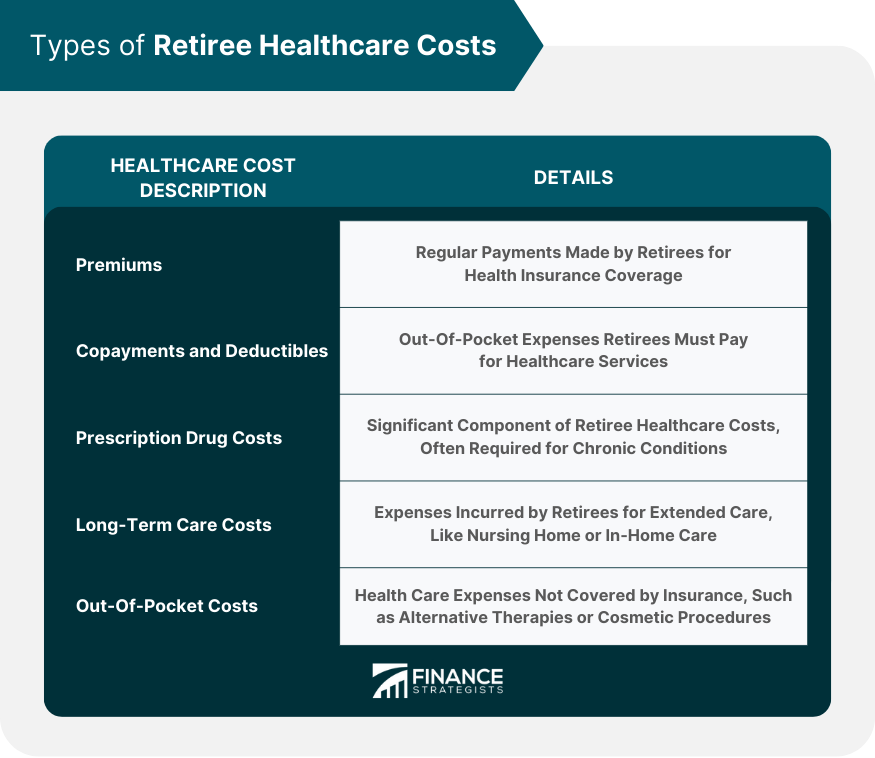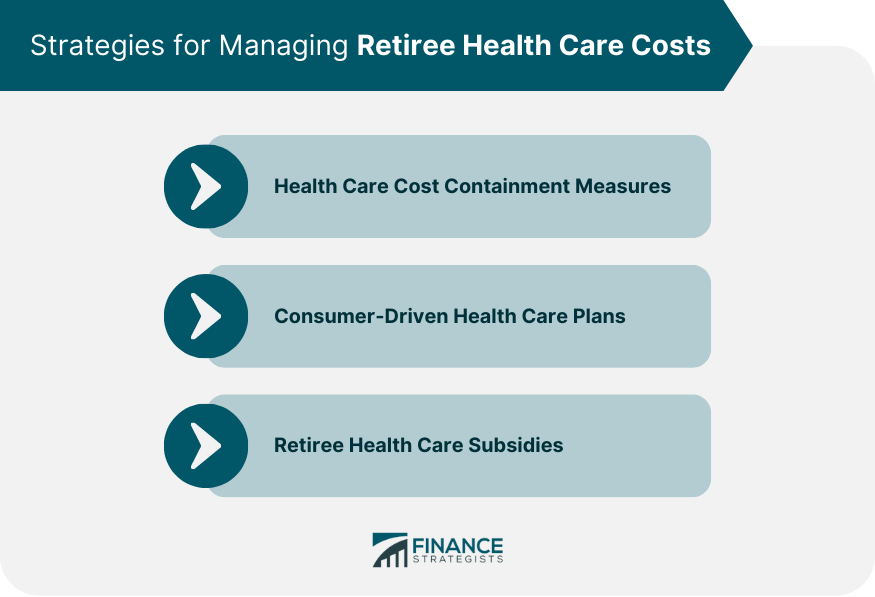Retiree health care costs refer to the expenses incurred by retired individuals for medical services, treatments, and medications. These costs may include out-of-pocket expenses, insurance premiums, and other related costs necessary to maintain an individual's health and well-being during retirement. One of the primary reasons retiree healthcare costs are a concern is the nature of health insurance coverage for retirees. While many individuals rely on employer-sponsored health insurance during their working years, retiree health benefits are often different or may not be provided at all. Furthermore, healthcare costs tend to increase with age, as individuals may require more frequent medical visits, specialized treatments, and medications. Long-term care needs, such as nursing home care or home healthcare services, can also present significant expenses in retirement. It is crucial to understand retiree health care costs as they can significantly impact one's retirement savings and quality of life. Being aware of these costs allows retirees to plan and budget more effectively, ensuring that they can cover their health care needs throughout their retirement years. Premiums are the regular payments made by retirees for their health insurance coverage. Retirees can either purchase insurance directly from the insurance company or get coverage through their former employer. Premiums can vary depending on the type of coverage, the retiree's age and health status, and other factors. Copayments and deductibles are out-of-pocket expenses that retirees are required to pay for health care services. Copayments are fixed amounts paid for each visit or service, while deductibles are the amounts that must be paid before the insurance coverage kicks in. These costs can vary depending on the retiree's insurance plan. Prescription drug costs are a significant component of retiree health care costs. Retirees often require prescription drugs to manage chronic conditions, and the cost of these drugs can be high. The out-of-pocket cost of prescription drugs can vary depending on the retiree's insurance plan and the specific drugs prescribed. Long-term care costs refer to the expenses incurred by retirees for extended care, such as nursing home care or in-home care. These costs can be significant, and retirees may need to purchase additional insurance coverage or use their retirement savings to cover these expenses. Out-of-pocket costs refer to any health care expenses that are not covered by insurance, such as alternative therapies or cosmetic procedures. These costs can vary depending on the retiree's insurance plan and the specific services sought. The age of the retiree plays a significant role in determining health care costs, as older individuals generally require more frequent and extensive medical care. As people age, they are more likely to develop chronic conditions, which can lead to higher health care expenses. A retiree's health status is another crucial factor affecting their health care costs. Those with pre-existing conditions or chronic illnesses may require more medical attention and treatments, leading to higher costs compared to individuals with relatively good health. The geographic location of the retiree can impact their health care costs due to regional differences in the cost of living, health care services, and insurance coverage options. Certain areas may have higher costs for medical services and treatments, affecting the overall expenses for retirees living in those regions. The type of health care coverage a retiree has can also greatly influence their health care costs. Different insurance plans may offer varying levels of coverage and out-of-pocket expenses, which can directly impact the retiree's overall health care costs during retirement. Health care costs have been steadily rising over the years, making it increasingly challenging for retirees to afford necessary care. Factors such as inflation, technological advancements, and increased demand for medical services contribute to the upward trend of health care expenses. The aging population is another factor contributing to the increase in retiree health care costs. As the number of retirees grows, so does the demand for medical services, leading to higher costs and potentially straining the health care system. Employer-sponsored retiree health benefits have historically played a significant role in helping retirees manage their health care costs. However, in recent years, many employers have reduced or eliminated these benefits due to rising health care costs, shifting more of the financial burden onto retirees. One strategy for managing retiree health care costs involves implementing cost containment measures such as negotiating lower prices for medical services and prescriptions or promoting preventive care to reduce the need for more expensive treatments. These measures aim to keep health care costs under control and more manageable for retirees. Consumer-driven health care plans, such as health savings accounts (HSAs) and high-deductible health plans (HDHPs), are another strategy to help manage retiree health care costs. These plans encourage individuals to take a more active role in their health care decisions and can potentially lead to lower overall costs. Some retirees may be eligible for health care subsidies, such as those offered through Medicare or other government programs. These subsidies can help offset some of the retiree's health care costs, making it more affordable to maintain their health and well-being during retirement. Retiree health care costs are a significant consideration for individuals planning for retirement. These costs encompass a wide range of expenses, including premiums, copayments, deductibles, prescription drug costs, long-term care costs, and out-of-pocket expenses. Factors such as age, health status, geographic location, and the type of health care coverage can impact the overall costs. It is important to stay informed about these costs and take proactive measures to manage them effectively. The rising costs of health care and the impact of an aging population contribute to the increasing burden of retiree health care expenses. Additionally, the decline of employer-sponsored retiree health benefits has placed more responsibility on retirees to cover these costs. To mitigate the financial impact, retirees can consider various strategies such as implementing cost containment measures, exploring consumer-driven health care plans like HSAs and HDHPs, and investigating retiree health care subsidies. By understanding retiree health care costs and planning accordingly, individuals can make informed decisions, effectively budget for these expenses, and ensure their overall financial security and well-being during retirement. Being proactive and exploring available strategies can help retirees navigate the complex landscape of health care costs, ultimately leading to a more financially stable and enjoyable retirement.Definition of Retiree Health Care Costs
Types of Retiree Healthcare Costs
Premiums
Copayments and Deductibles
Prescription Drug Costs
Long-Term Care Costs
Out-of-Pocket Costs

Factors Affecting Retiree Health Care Costs
Age of the Retiree
Health Status of the Retiree
Geographic Location
Type of Health Care Coverage
Retiree Health Care Cost Trends
Rising Costs of Health Care
Impact of an Aging Population
Employer-Sponsored Retiree Health Benefits
Strategies for Managing Retiree Health Care Costs
Health Care Cost Containment Measures
Consumer-Driven Health Care Plans
Retiree Health Care Subsidies

Final Thoughts
Retiree Health Care Costs FAQs
Retiree health care costs refer to the expenses incurred by retirees for healthcare services and coverage after they stop working.
Age, health status, geographic location, and type of health care coverage are the factors that can impact retiree health care costs.
Retiree health care costs can be managed through healthcare cost containment measures, consumer-driven healthcare plans, and retiree health care subsidies.
Rising healthcare costs and an aging population are the primary reasons behind the increase in retiree health care costs.
COBRA and other laws affecting retiree health care coverage, as well as healthcare reform, can impact retiree health care costs.
True Tamplin is a published author, public speaker, CEO of UpDigital, and founder of Finance Strategists.
True is a Certified Educator in Personal Finance (CEPF®), author of The Handy Financial Ratios Guide, a member of the Society for Advancing Business Editing and Writing, contributes to his financial education site, Finance Strategists, and has spoken to various financial communities such as the CFA Institute, as well as university students like his Alma mater, Biola University, where he received a bachelor of science in business and data analytics.
To learn more about True, visit his personal website or view his author profiles on Amazon, Nasdaq and Forbes.











